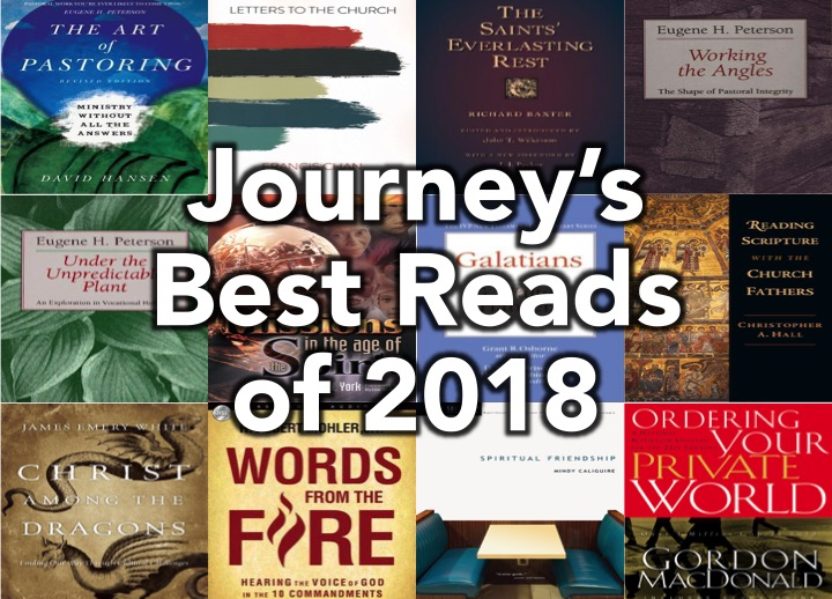Journey’s Best Reads of 2018
As the year ends, we offer our list of favorite reads for 2018. This is not a list of books published in 2018, but books read in 2018 whatever the publishing year. If a book is on this list, I recommend you give it a read this coming year.
In 2018 we read a number of good books, a few great books, some why-the-big-deal books, and a couple of why-was-this-ever-published books (partially). 2018 was another great reading year with many happy hours invested in the “Big Three”: good music, good coffee and a good book.
ADMISSION: I am not a fad reader. Some latest fad books remind me of the great Ambrose Bierce quote: “The covers of this book are too far apart.”When people cry out, “You have to read this latest-and-greatest book” I generally run – the other way. I am just not a follower of fads when it comes to books and authors. I wait for the dust to settle before putting my money down on a book that may be a great investment of my time and money or may be a waste of both.
Rather than follow the latest-and-greatest, I follow the sage counsel of C.S. Lewis, who said, “It is a good rule, after reading a new book, never to allow yourself another new one till you have read an old one in between.” It’s advice I follow with joy as rereads of previously read books are like visits with the oldest and best of friends.
This year I reread these old friends, friends that would make my “Best Reads of the Year” list in any year:
Back to Virtue by Peter Kreeft
Christian Coaching by Gary Collins,
Celebration of Discipline by Richard Foster,
Christ-Centered Coaching by Jane Cresswell,
Practicing the Presence by Brother Lawrence,
Survive or Thrive by Jimmy Dodd,
The Cost of Discipleship by Dietrich Bonhoeffer (first section),
Time for Truth by Os Guinness,
Why Revival Tarries by Leonard Ravenhill
And so (drum roll please) Journey presents in alphabetical order, our “Top Twelve” favorite reads for 2018 (doing a top ten was just too difficult). Each title is followed by the author’s name and a brief description of the “what” and the “why” that lead to the book making our list. Enjoy.
By the way, you can always find our list of recommended books online in the Journey Library. Check out our shelves at journeypastoralcoaching.com/the-jpc-library/
The Art of Pastoring – David Hansen (Pastoral Ministry)
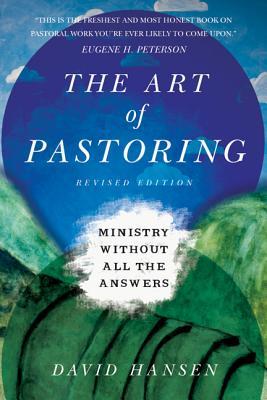
Frankly, this book surprised me: I wasn’t prepared for the depth and freshness of its wisdom – this book as rich in its insights as it is unknown by its target audience. It’s so rich that the dean of pastoral writing, Eugene Peterson, writes a recommendation of it, describing it as “The freshest and most honest book on pastoral work you’re ever likely to come upon.” High praise indeed.
So many books on pastoral ministry are superficial “how-to” reads that focus on pastoring instead of on the pastor – doing instead of being.
How many of us have library shelves lined with books that promise “the answer” to successful pastoral ministry, but sadly failed to even come close to delivering what they promise. The reason is that they focus on the imaginary success of “results” while neglect the real issue: not how to do pastoring, but how to be a pastor – focus on the being and the doing naturally follows. The Art of Pastoring does just that. If you read Dangerous Calling by Paul David Tripp, consider this book to be part two. Or maybe even part one.
Christ Among the Dragons – James Emery White (Church and Culture)
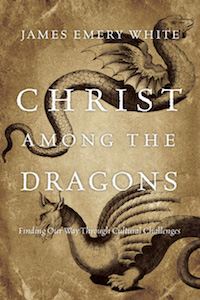
White argues that the church of the 21stcentury finds itself on a journey that has led it to the very edge of the world, uncharted waters where “Here be dragons” of every sort and a great abyss waits to swallow us up. Truth is no longer considered absolute, orthodox faith is called heresy, culture is in collapse (even as the church runs after it, seeking to be relevant to it), and the church is fading even as it claims a name that says it is alive.
White writes a “State of the Union” for the church with regard to these four phenomena, describing how we have lost our way. But make no mistake: White’s writing is not sounding an alarm that the sky is falling as much as offering a reminder that the sky (heaven) can descend to earth through a church ready to seize its moment in time. He writes that the church must once again establish its foundations (“regain its sense of true north”). If it can do so, it will not only survive these times but thrive in them and see many come to faith in Christ.
White charts a course for writing this future history by encouraging the church to once again mark four fixed points in its sky as it travels: truth (“truthiness”), orthodox faith, a right understanding of culture, and the church being the church of Jesus Christ. His book is a map, a charting of the way, for the church to do just that. A page turner.
Galatians – G. Walter Hansen (Commentary)
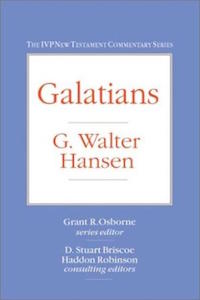
I try to read a volume from the outstanding IVP New Testament Commentary Series every year. This year, because of coaching conversations, Galatians seemed an appropriate choice, given the major themes of Paul’s work on the grace of the Gospel, a grace that freely unites us with Christ and with the body of Christ.
Young ministers often struggle with grace – what it is, what it does, why they do not deserve it – but why they can and must accept freely from the Christ who died and rose again to give it to us for all-too-real life in an all-too-real world.
Hansen’s verse-by-verse work speaks of the hope that is ours as we let the Spirit of God do in us and through us what we cannot do for ourselves. Highly readable, this book is a great blend of theology and worship, a doxology in commentary, if you will.
Letters to the Church – Francis Chan (Church)

This is one of the few books I read that was actually published in 2018. It is a letter to the church about the church. If you’ve pastored more than a few years this book will read like a family meeting concerning that one member of your family who is so troubled but so loved by everyone. This book aches. This book weeps.
And yet, this books speaks hope, possibilities, and life. It speaks of what church can be again. It speaks of what church must be again.
Agree or disagree with Chan’s house church model, agree or disagree with his theology on women in ministry, but if you’ll look past the contemporary issues to the core principles, this is a book that will cause you to dream of what your church can be – what the New Testament teaches that it can be. As I read LTTC, I found myself dreaming of the church Chan describes.
No, I did not agree with all that I read in LTTC. Yes, that is one reason why I loved this book because even in disagreeing with Chan from time to time, I had to examine my own views and ask myself why. How many books did you read this year that made you ask the why questions? How many did you read that told you – told you – what to do, but never asked you why? Think for yourself, Pastor! Let LTTC help you do that. Even if you find yourself disagreeing with the author.
Missions in the Age of the Spirit – John York (Missions)
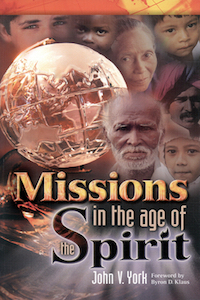
An absolutely essential read. John York writes a beautiful and moving biblical theology of world missions. From Genesis to Revelation, York lets Scripture tell the story of the Great Commission. It’s a story that far too many pastors don’t know, and some don’t even care to know (I know because I met them in my travels as a missionary). And because they don’t know the biblical theology of missions, their people are ignorant of it as well.
And yet, the story that York tells is nothing less than the reason why Jesus came to earth the first time and the reason why He has not come the second time. It’s nothing less than the story of why we are on this earth. York writes with an infectious enthusiasm of the Holy Spirit’s essential work in world missions. More than academic theory or a cover-our-bases tacked on “Yes-we-believe-in-the-Holy-Spirit” way, York beautifully describes the partnership we walk with the Holy Spirit in carrying out the Great Commission: the Holy Spirit is powerfully and personally present, walking with each of us as we carry out Jesus’ mission to take the Gospel to all the world.
By the time you’re finished reading, you’ll not only be praying over how you can be a part of this great unfolding of the biblical mission, but you’ll find yourself being guided by the Spirit in that work.
Ordering Your Private World – Gordon MacDonald (The Inner Life)
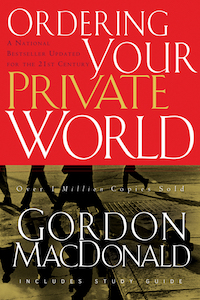
At the beginning of 2018 we recommended this classic work to all Journey Pastoral Coaching members, encouraging each one to prayerfully read and reflect on it. It quickly became a common theme in our coaching conversations.
Many books are deemed classics but not all deserve this designation; this one does. Whatever you’re reading right now, put it down and pick up this one – or at least set it in the “next” position of your “to read” book stack. The premise is one almost universally ignored by Christians, but universally essential to all Christians: how each of us can order our inner world in such a way that it governs, feeds and sustains a healthy and thriving life in the exterior world.
MacDonald leads the reader through a thoughtful examination of motivation, time, wisdom, knowledge, spiritual strength, and restoration. If you only read one book this year, make it this one.
Reading Scripture With the Church Fathers – Christopher Hall (Theology and Church History)
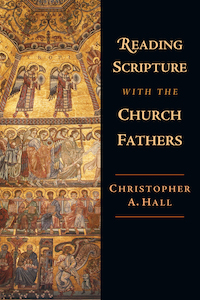
In a 21stchurch plagued by an “it-means-this-to-me” theology, there is at the same time a small but significant move among young pastors for truth and biblical orthodoxy. This means understanding the Scriptures as written. And so, this means reconnecting with the early church, including the writings of the church fathers from as early as the third century. This book is an excellent primer in this pursuit.
Hall makes it easy for the reader to get the big picture on the writings and activities of the church fathers, examining them individually and as a group by their geographic schools – Eastern and Western, and their hermeneutic schools – the allegorical and the literal. Very readable, this book will not take you into all the corners of the church fathers, but it will introduce them to you.
As important, it will remind you that these earliest of theologians were local church pastors and bishops who preached to congregations on Sundays and walked with their people on Mondays. As such, their doing of theology was not ivory tower, but kitchen table – it was written by the hands of theologians who worked among the objects of that theology: people for whom Christ died. It’s a strong lesson for us today as we choose which authors we will read. Hall also reminds us that these early theologians wrote to and for each other, dialogued with each other, and yes, even argued with one another in the vital process of doing theology together. They were committed not to their individual positions, but to truth and sound theology, i.e., the orthodox faith. Another vital lesson for the reader in this day when marketing defines so much of what is published as “Christian.”
The Saints’ Everlasting Rest – Richard Baxter (The Inner Life)
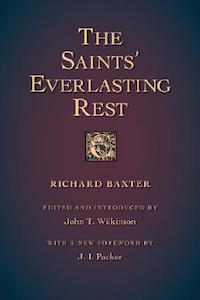
I admit that few will find this title from 1650 interesting and even fewer will take the time to read it – few did when it was originally published. And so, only a few will discover the treasures within these pages. But those who do read it will find a devotional Ruth’s Chris steak in a McDonald’s Christian publishing world.
The question Baxter considers is a simple one: What will our eternal rest be like? He then asks how we can best prepare for, even experience and enjoy that life to come. His answers flow like a diary from the Apostle Paul in his third heaven experience.
For its grammar and for its themes, this is not always an easy read. Frankly, if your pleasure is found in this world, this book will only be other worldly chatter to you. But if you seek to delight in the Lord of Heaven while on this earth, you will find it well worth the effort. What’s for dinner tonight: fast food or a good steak?
Spiritual Friendship – Mindy Caliguire (Inner Life)
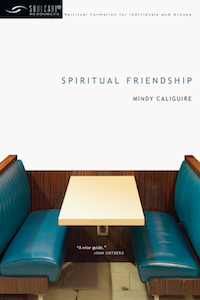
Don’t let the small size of this book fool you: this is a great practical read on spiritual formation. Just the list of individuals who write recommendations make this book a must read: John Ortberg, Scot McKnight, and Richard Foster.
Caliguire says that the inspiration for her book came from her own soul malnourishment, confusing relationships, and disillusionment – a spiritual numbness and the sense that she was losing connection with God. Those “feelings” were in fact the hungerings of her soul for God. But how to satisfy those hungers? Her search led her to the rediscovery of what I call “peer mentorship”: two sisters in Christ walking together in a real and practical plan focused on communion with each other and with God. Yes, we need communion with God, but an essential part of that communion is given to us by God through others – a very small circle of significant others: it is in reaching out to others that we see, hear, and feel God reaching out to us. I often tell those whom I coach that God did not build each of us to walk alone. We can’t do it because we’re not built to do it. Not even the so-called “Supermen” or “Superwomen” among us. Isolation is the number one killer of young ministers. This great guide will help you kill the killer.
Under the Unpredictable Plant – Eugene Peterson (Ministry)
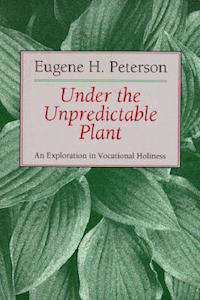
The story of Jonah. But not as you’ve read it before. When we read the story of Jonah we tend to focus on Jonah and what he did (or did not). But the real story, biblically, is what Jonah was and was not – his being. Peterson takes us there, tying our vocation to our being rather than to our doing.
This is a study in creation and calling: God has created me with purpose; God has called me with purpose; my vocation is how I live out that purpose; am I living according to the purpose of God (my creation and call)?
UTUP is a call back to living in and living out our purpose by living out our creation and call from the inside out, rather than the outside, in. In other words, instead of defining ourselves by what we do as ministers (or our positions and labels), we define ourselves by who we are as servants of God (whatever our positions and labels. This book can set a lot of ministers free – free from pressure to perform and compete. It can set you free.
Words From the Fire – Albert Mohler (Theology)
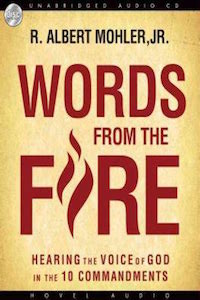
One might dismiss this book as just another treatment of the Ten Commandments but nothing could be farther from the truth. Mohler takes us back to the fire from which God spoke when He gave us the Decalogue: “Has any people heard the voice of God speaking from the midst of the fire, as you have heard it, and survived?” (Deuteronomy 4.33).
Looking into that fire, Mohler reminds us of its light, the absolute truth revealed by the Voice – unchanging and eternal truth that culture cannot change however hard it fights against it. Looking into that fire, Mohler reminds us of its heat, the infinite grace delivered by the Voice – the unstoppable and unflagging grace of God that comes to us in His commands.
Looking into that fire, Mohler not only reminds us but refreshes us in the promise of God that as we keep His statutes and commandments, God’s blessing will be on us. I might also add that Mohler takes the time to go deeper into the Ten Commandments than we may have previously considered. Yes, you’ll appreciate the theology of this book, but you’ll be surprised by its beautifully doxology.
Working the Angles – Eugene Peterson (Pastoral Ministry)
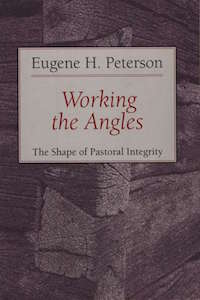
This was the “Year of Peterson” for me – I read six of his books and this was the one that meant the most to me. I read it twice! And, though I am not one to write in the margins of my books (preferring only to make almost indistinguishable pencil marks) I so filled the margins of one copy of this book that I had to purchase a second clean copy for my shelves.
The subtitle of the book says it all: The Shape of Pastoral Integrity. This is Peterson as prophet: Jeremiah and Isaiah. On one side he rails against us for abandoning our call as pastor to waste our time (he calls it “whoring after other gods) on things that give us pleasure, comfort and a sense of personal meaning but ignore the high calling God has placed upon us. On the other side (and the larger side to be sure), Peterson weeps with us and consoles us, “’Comfort! Be comforted my servants,’ says your Lord.”
Like Jeremiah and Jeremiah, Peterson commands us to cease being shopkeepers consumed with satisfying customers and commit again to being shepherds compelled to lead our sheep to green pastures and still waters – even if a few choose to walk away. Our task is not to please people, but God. And that means keeping our people focused on God. To do this, Peterson reminds us that true pastors have three principle ministries: prayer, Scripture, and spiritual direction.
Peterson casts stone after stone at a church world demanding that pastors be CEOs, internet stars, marketers, and fundraisers even as he offers “Well done, good and faithful servants” to ordinary pastors who do the ordinary work of being – being – pastors. It is these servants who shepherd well God’s people and please the Great Good Shepherd.
———-
NOTE: Journey Pastoral Coaching provides pastoral coaching to young ministers.
Saddled with large student debt, just beginning to set up homes and start families, and serving in low paying first and second positions, young ministers are those who most desire but can least afford to pay for pastoral coaching.
So we offer it to them at NO COST: members don’t PAY for coaching; they EARN it.
We are able to do so through the faithful and generous gifts of friends who want to see young leaders not only enter the ministry, but remain in the ministry. If you or your church would like to help young ministers in 21 US states and 5 nations build strong for a lifetime in ministry, please click here to contact us by email or to support Journey monthly or with your one-time gift. Thank you.
We also invite you to click and subscribe to our twice-monthly blogs at journeypastoralcoaching.com
“In the early years when I was becoming a pastor, I needed a pastor.”
Eugene Peterson, “The Pastor: A Memoire”


